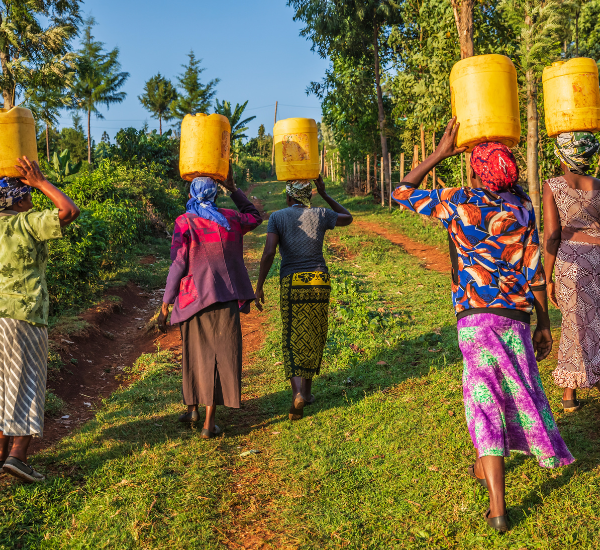
Neighborly Practices in Zulu Culture
Neighborly Practices: Zulu Culture (IsiZulu)
Zulu people promote good neighborly practices and value proverbs and phrases to communicate essential teachings. The following activities and proverbs are used in the Zulu culture to promote neighborly practices.
ACTIVITIES
Igeja
Igeja means “hoe,” as it is derived from the activities that people in the community normally do to help each other with planting and plouging, especially in rural areas. A communal meeting amongst men is held during the Spring season at the chief’s place. The chief will announce when planting of staple crops like maize, pumpkins, and dry beans may commence. This planting typically happens between October to mid-December. The community comes together to do “igeja” by helping each other with planting and plouging. The planting and ploughing are done using cattle/ oxen, spades, hoes, and tractors. A tractor-drawn plough is used for the bigger fields (insimu), which reduces their workload.
They take turns planting and ploughing each other’s land. When it is one’s turn, the women in that family prepare staple food (uphuthu with imfino, meat, and amahewu) for the people helping with ploughing in the field. By mid-December, every household would have benefitted from this.
The same applies when it is the harvesting season. During this time, almost everyone is involved, from children to women and men. They usually harvest by hand, then sort, sieve, and clean their crops carefully before storing them. Different ways of storage are used. Some crops are dried in the sun, e.g., maize and beans. Maize may then be removed from the cob, cleaned, and stored in a steel tank container with a rainproof roof using a tight-fitting lid that will enable side ventilation because the tank is kept outside for efficient storage. Alternatively, they store whole grains in hermetic bags. Preferably, a liquid insecticide is applied on the inside of the bag or tank to repel insects from damaging the grains.
These grains are kept for future use, especially during winter when conditions are unsuitable for growing crops. Some farmers sell their harvest commercially to earn a living. During this time, the whole community rejoices as no family lacks food.
Ukulilisana/ Umthelelwano
Ukulilisana or Umthelelwano means “crying together” or “contributions .”The community engaged in this kind of activity as a way of helping each other. Tragedies such as death may occur when one has no means to conduct a funeral for his deceased relative or family member. During this time, “ukulilisana” or “umthelelwano” is beneficial. Monthly, the community contributes a sum of money collected by an appointed person (treasurer). The person appointed as a treasurer must be a man or a woman trusted by the community and has strong Christian values and morals. These contributions are made in monetary form. When tragedy befalls a member of this society, the society will pay out a certain amount agreed upon when joining to that family. Members of the group will then visit the bereaved family and hand over the money and some food items to assist with funeral arrangements.
This kind of activity is not compulsory but open to anyone willing to participate. Most community members engage in this society. It assists during funerals, but it also helps during weddings. The community will also give a hand in food preparation, doing house chores (like fetching water and wood), providing household 3 -legged pots and dishes, and men will assist with the slaughtering and cutting the meat.
Ukusisa
Ukusisa is when one neighbor assists another less privileged neighbor by lending him something. Ukusisa can be done in different ways.
- Ukusisana ngengane (Helping each other with a child):
- Ukusisana ngengane is usually done among relatives. Family members or relatives may agree to lend a particular child to a family with no children to assist them with the house chores and all other duties that male or female children perform.
- Ukusisana ngemfuyo (Lending of the livestock):
- In rural areas, a man’s wealth is measured by the livestock he owns. One of his neighbors may be less privileged or has no livestock. The neighbor with livestock may lend his neighbor a cow and a bull to provide milk and amasi (fermented milk) for his family and use the bull to plough his fields. The dignity and respect for the receiver are restored in the community.
Before one lends his livestock to his neighbor, both parties approach the chief and notify him of their agreement. They also have to inform the dipper (cows in the villages/ rural areas are taken to the dip where they get vaccinations and check-ups to guard against emerging diseases). Each cattle owner is given a dipping card that records the number of cattle he owns and brings to the dip. The primary purpose of notifying the dipper is to transfer the cattle to the neighbor receiving the cattle and be aware of the agreement between the two parties. If one of the cattle given to the neighbor dies, he is not liable to pay back the cow. The dipper will be notified by being given the liver of the cattle that died as proof so that he can cancel it from the dipping card.
After a certain period, when the cow has given birth and multiplied, the receiver may return the cow or the bull borrowed from his neighbor. Such a gesture shows that the spirit of ubuntu (humanity) and empathy is still highly upheld by the African culture to promote good neighborly practices and values.
PROVERBS AND PHRASES:
African proverbs serve as life’s teachings imparting morals, wisdom, and perception of life. They play a pivotal part in the way communities live. They are the gems of wisdom as they give a wiser potency to convey moral attitude, e.g., appreciation, regret, approval, apology, the act of doing what is right or wrong.
Proverbs still exist and are used to preserve our African culture. Our ancestors have used them and will continue to be used by future generations. They are used to express our emotions and intellect. Sometimes, a person can show excitement or disappointment by using proverb phrases.
It is not uncommon or rare to use proverbs when conveying a message. For instance, when a twin male or female has passed away, the family may appoint a member to inform the community or the chief. The messenger may not convey the notice directly but may use a proverb as a way of showing his respect and sympathy (consolation) by saying…. “as you know, akukho mango ongenaliba,” meaning there is no hillside without a grave ( ingane kabani ) If he is conveying the message about the male twin he will say “uyosebenza” meaning “he has gone to work.” If it is the female twin, he will say, “she has gone to get married,” meaning that person has passed on.
Also, delivering messages when celebrating a certain ceremony or event like a wedding day, the mother of the groom may say these words while ululating; “Ukuzala kuzolula, asazi wena mfazi ongazalanga,” meaning “when you give birth to a male child, you know that he will bring you someone to give you relief. It’s a pity to a woman who has no child.” This is not seen as an insult to those childless married women but seen as a sign of excitement and joy and is celebrated by all.
Some examples of Zulu proverbs that you will find in their everyday use are:
- Kuhlonishwa kabili (respect is two ways): You must give respect to earn respect.
- Inhwa ayibanjwa ngekhanda isavela: (Do not catch the winged termite by its head) Meaning, before judging a person, you must have or hear the facts or the whole story.
- Impungushe ayivalelwa nezimvu (You can’t keep the jackal in the same kraal as the sheep): Do not put together people who do not see eye to eye – who are total opposites as you will not get good results out of them as they will always clash.
- Iso liwela umfula ugcwele (the eye crosses the river even if it is full): Nothing can stop you from achieving your goals as long you have the desire and a drive to do it.
- Ukudla indlu yakho njengentwala (to eat your house like lice): Do not despise someone or something that was once beneficial to you because you might need it next time as no one knows what tomorrow will bring.
CONCLUSION
Proverbs will remain in existence among the African culture and for future generations to be used to convey messages, teach and reinforce wisdom and morals. They are also an inspiration to society as a whole as they are used in many ways to relieve or console in certain situations.
